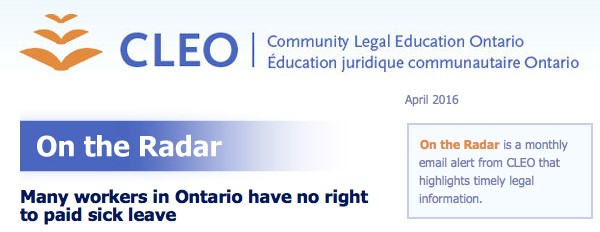Many workers in Ontario have no right to paid sick leave
Recent reports point to the many negative effects that lack of paid sick time has on workers. Illnesses spread because workers can’t afford to take time off and hospital emergency departments see people who can’t get to their doctors during office hours.
This month’s On the Radar talks about the personal emergency leave available to people covered by rules in Ontario’s Employment Standards Act and how these rules fail to meet the needs of many workers.
The right to take time off for illness
The Employment Standards Act (ESA) gives some workers the right to take up to 10 days of “personal emergency leave” each year. This right applies to workers who:
- are covered by the ESA, and
- work for a company that regularly employs at least 50 workers.
Because personal emergency leave does not apply to workers in smaller companies, it’s estimated that 1.6 million workers in Ontario are not covered. That’s almost 1 in 3 workers, many of whom work in retail, food services, health care, and other sectors that involve contact with the public.
Other rules in the ESA may apply if a worker needs more than 10 days off for illness or some other crisis.
Getting paid
The ESA does not say that an employer has to pay workers who take personal emergency leave.
But a worker might have the right to be paid if:
- they’re in a union
- they have a workplace policy or employment contract that gives them this right
Taking personal emergency leave
A worker can use personal emergency leave if the worker or a family member is sick, injured, or has a medical emergency.
They can also use it when a family member has an “urgent matter”. The ESA has rules about what is an urgent matter and who is a family member.
Giving employers proof
Employers can ask for proof of the need for personal emergency leave. So workers who take time off for illness may need to get a doctor’s note.
This applies even if they have a cold or other illness that does not require medical treatment. Doctors say that this adds unnecessary costs to our health care system.
A doctor’s note should include:
- how long the worker needs to be away or how long they needed, if they’ve already been away
- when they went to the doctor
- whether the doctor signing the note saw the worker in person
But an employer does not have the right to know the diagnosis or treatment.
Getting legal help
The ESA says that employers can’t punish workers for asking about their rights or acting on their rights. If an employer punishes a worker for asking about or taking personal emergency leave, there may be steps the worker can take.
Workers who have questions or need help to deal with a problem at work can read more in CLEO’s Where can I get help and advice about my rights as a worker?
Calling for change
Workers’ advocates and others, including many doctors, have called on the Ontario government to give all workers the right to paid sick days without the need for a doctor’s note.
The government is reviewing the laws that cover workers, including the ESA, and is expected to release an interim report this spring.
This email alert gives general legal information. It is not a substitute for getting legal advice about a particular situation.
*This article is reproduced with permission of CLEO (Community Legal Education Ontario).
Original Source: http://us4.campaign-archive2.com/?u=acaece29df8d07c95ef84a763&id=fadf517665


